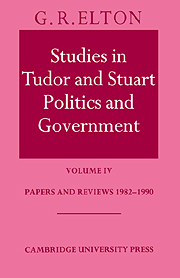Book contents
- Frontmatter
- Contents
- Preface
- Acknowledgments
- Abbreviations
- I POLITICS AND THE REFORMATION
- 49 The State: Government and Politics under Elizabeth and James
- 50 Lex Terrae Victrix: the Triumph of Parliamentary Law in the Sixteenth Century
- 51 Human Rights and the Liberties of Englishmen
- 52 King Henry VII
- 53 Wales in Parliament, 1542–1581
- 54 Piscatorial Politics in the Early Parliaments of Elizabeth I
- 55 English National Self-consciousness and the Parliament in the Sixteenth Century
- 56 Thomas More and Thomas Cromwell
- 57 Lancelot Andrewes
- 58 Persecution and Toleration in the English Reformation
- 59 Auseinandersetzung und Zusammenarbeit zwischen Renaissance und Reformation in England
- 60 Humanism in England
- 61 Luther in England
- 62 Die europäische Reformation: Mit oder ohne Luther?
- II ON HISTORIANS
- Index of Authors Cited
- General Index
55 - English National Self-consciousness and the Parliament in the Sixteenth Century
Published online by Cambridge University Press: 03 February 2010
- Frontmatter
- Contents
- Preface
- Acknowledgments
- Abbreviations
- I POLITICS AND THE REFORMATION
- 49 The State: Government and Politics under Elizabeth and James
- 50 Lex Terrae Victrix: the Triumph of Parliamentary Law in the Sixteenth Century
- 51 Human Rights and the Liberties of Englishmen
- 52 King Henry VII
- 53 Wales in Parliament, 1542–1581
- 54 Piscatorial Politics in the Early Parliaments of Elizabeth I
- 55 English National Self-consciousness and the Parliament in the Sixteenth Century
- 56 Thomas More and Thomas Cromwell
- 57 Lancelot Andrewes
- 58 Persecution and Toleration in the English Reformation
- 59 Auseinandersetzung und Zusammenarbeit zwischen Renaissance und Reformation in England
- 60 Humanism in England
- 61 Luther in England
- 62 Die europäische Reformation: Mit oder ohne Luther?
- II ON HISTORIANS
- Index of Authors Cited
- General Index
Summary
The English people early acquired a high degree of national selfconsciousness – if by this term we mean an awareness of their own identity and their difference from other nations. Geography helped, in two quite different ways which on the face of it one might have thought contradictory. The boundaries of an island identified themselves with a precision that was lacking in the rest of Europe – a part of the medieval world in which apparent frontiers served rather to mingle the members of adjacent kingdoms and separate them from their own hinterlands, creating a dark area of marches in which national self-identification retreated before a common consciousness resting on a difference shared along the border. In England, the fact that there existed one such march right into the sixteenth century happened to increase the national feelings of the people. The march against Scotland displayed many of the characteristics of such frontier belts as they were found, for instance, in the Iberian peninsula (Moors and Christians confronting each other but growing like each other in the course of time), or along the eastern edge of the Holy Roman Empire. Along the Anglo–Scottish border, too, a broad strip of territory extending south and north stood apart from both England and Scotland away from the march; and here also common experience and private relations across the supposed divide brought into existence a marcher people of both English and Scots who were more clearly marked by these experiences and relations than by their supposed English and Scottish nationhoods. Yet on the English side at least the fact of Englishness was also never forgotten.
- Type
- Chapter
- Information
- Studies in Tudor and Stuart Politics and Government , pp. 131 - 143Publisher: Cambridge University PressPrint publication year: 1992



